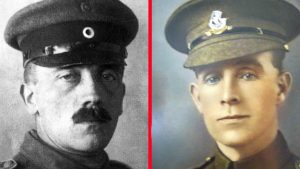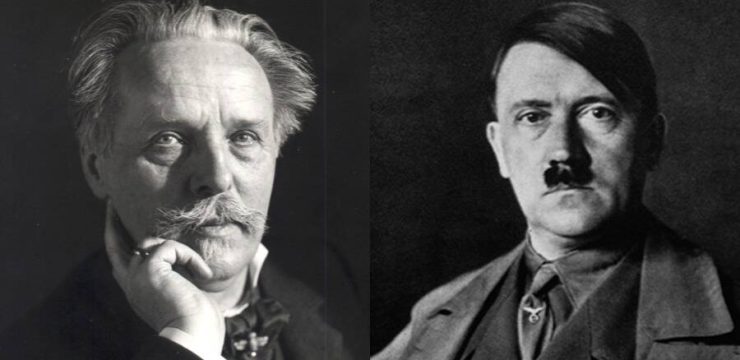On September 28, 1918, during the Fifth Battle of Ypres, something extraordinary is said to have happened. British soldier Henry Tandey, known for his heroic acts during World War I, allegedly made a decision that would go down in history. Instead of killing a wounded German soldier on the battlefield, Tandey chose to spare his life. Little did he know that this act of compassion would later be linked to one of the most notorious figures in history: Adolf Hitler.
The Military Career Of Henry Tandey
Henry Tandey was born on August 30, 1891, in Leamington Spa, Warwickshire, England. Despite a tough childhood spent partly in an orphanage, Tandey attended the local St. Peter’s School and eventually found work at the Regent Hotel. However, he wanted more excitement in his life. In 1910, at the age of 19, Tandey enlisted in the British Army.
During World War I, Tandey made a name for himself as a courageous soldier. He fought in major battles such as the First Battle of Ypres, but also suffered injuries at the Battle of the Somme and the Battle of Passchendaele. Nevertheless, his determination never wavered. In 1918, Tandey played a crucial role in the British capture of Marcoing, an act that earned him the Victoria Cross for “conspicuous bravery.” He also received the Military Medal and the Distinguished Conduct Medal, making him the most decorated British private of the war.
An Alleged Encounter With Adolf Hitler
Fast forward to 1938, when British Prime Minister Neville Chamberlain visited Germany to negotiate a peace pact with Adolf Hitler. During his stay at Hitler’s Bavarian mountain retreat, known as the Berghof, Chamberlain noticed a painting depicting Allied soldiers at the Menin Crossroads in 1914. Hitler then claimed a special connection to the British soldier in the foreground of the painting. According to Hitler, this soldier had nearly killed him but spared him at the last moment.

The soldier in question was none other than Henry Tandey. Hitler had seen Tandey’s picture receiving the Victoria Cross in a newspaper and had also come across a painting of Tandey’s regiment, the Green Howards, created by Italian artist Fortunino Matania. Hitler wanted a copy of the painting.
Did Henry Tandey Actually Spare Adolf Hitler?
There is some evidence to support the story of Tandey sparing Hitler. A copy of the Matania painting was indeed found at Hitler’s retreat, signifying its importance to him. Hitler’s adjutant, Fritz Wiedemann, expressed the Führer’s gratitude to the Green Howards Museum for sharing the image, stating that Hitler was moved by it.
However, Tandey’s biographer, Dr. David Johnson, casts doubt on the authenticity of the alleged encounter. Johnson argues that Hitler would not have been able to recognize Tandey in the painting or even in a photograph because the soldier who spared him would have been covered in mud and blood. Additionally, records show that Hitler’s unit had been moved far away from Tandey’s 11 days before the supposed encounter, and Hitler was on leave during that time.
Johnson suggests that Hitler fabricating the story to enhance his image is a more plausible explanation. Hitler wanted to impress the German people by claiming he had been saved for a greater purpose, further glorifying himself and his vision for Germany.
Henry Tandey’s Response To The Allegations
Henry Tandey first heard about Hitler’s story in 1938, when another officer told him about Chamberlain’s conversation with the dictator. Tandey initially couldn’t recall whether he spared Hitler, but in 1940, he appeared to accept the story as fact, regretting his decision to let Hitler live. However, this newfound acceptance came after Tandey’s home had been bombed by the Luftwaffe, so it’s possible that he was emotionally affected by the destruction.
Interestingly, Tandey never spoke publicly about the alleged incident again. Johnson notes that the story only resurfaced after Tandey’s death in 1977, leaving the validity of Hitler’s claims unconfirmed.
Regardless of the encounter with Hitler, Henry Tandey remains one of the most remarkable soldiers of World War I. His bravery and honorable conduct set him apart, making him the most decorated British private of the war. Perhaps it is his remarkable military record that should be remembered and celebrated.

